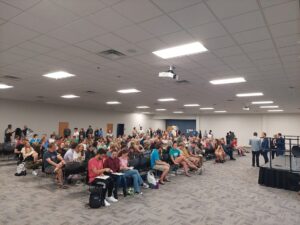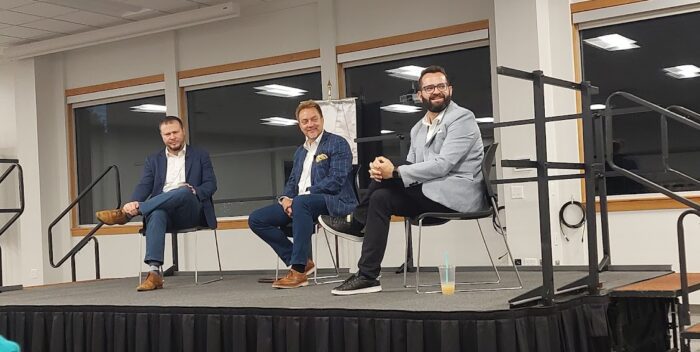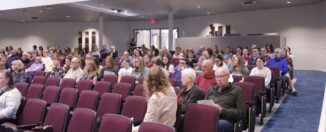Speakers talk about shared virtues of Christianity, Islam
Photo description: From left: Ismail Royer, Director of the Islam and Religious Freedom Action Team; Rev. Dr. Greg Seltz, member of the Lutheran Center for Religious Liberty; and Kevin Singer, President of Neighborly Faith, engage in a discussion on religion freedom
Photo credit: Cameron Schroeder
Nora Betts
Sower Staff
Muslim speaker Ismail Royer and Lutheran speaker Rev. Dr. Greg Seltz talked about the importance of religious freedom and the shared virtues of Christianity and Islam in a discussion on Concordia’s campus this week.
 The discussion, sponsored by the nonprofit organization Neighborly Faith, attracted a crowd of around 200 students, faculty and community members to Concordia’s Cattle Conference Room. The conversation was not a debate on religious differences but an opportunity to examine what religious freedom means from two points of view and to recognize Christianity and Islam’s similar foundations.
The discussion, sponsored by the nonprofit organization Neighborly Faith, attracted a crowd of around 200 students, faculty and community members to Concordia’s Cattle Conference Room. The conversation was not a debate on religious differences but an opportunity to examine what religious freedom means from two points of view and to recognize Christianity and Islam’s similar foundations.
Christianity and Islam differ in their beliefs on the person of Jesus but agree in their faith in the God of Abraham, Seltz and Royer said. Royer called the kinship between the religions a “virtue friendship,” meaning that they hold the same basic truths and should sympathize with each other.
Royer said that Muslims share the same mindset as Christians regarding freedom of religion. He said that Muslims want religious freedom for everyone, including Christians.
“It’s a human good that people be able to worship and believe and live their faith in public,” said Royer. “Because we want good for everyone, we should want that for [Christians].”
Royer said that because Christianity spreads the same moral truths as Islam, he and other Muslims hope for the growth of Christianity in the United States.
“It is in the interest of Muslims that the Christian virtues survive and revive in America,” he said.
In an earlier presentation to Concordia students and faculty, Royer said he does not predict that Islam will expand in America. He said that since Islam and Christianity’s virtues overlap, the growth of Christianity is the next best thing.
Royer said he would rather Christianity grow than secularism in America because “God is at least being mentioned” in the Christian faith.
He said that when religion is torn down by secularists, the result is not neutrality, but the rejection of moral truth.
Royer said he sees irreligion today in public schools. He said that public schools are trying to indoctrinate children against religion, which he called an overstep of the government into parents’ rights and religious freedom.
“The human being, by virtue of his or her creation, has the inherent right to raise their children as they wish upon the faith they wish,” said Royer. “That cannot be violated, [yet] that is what is happening.”
Seltz said the government would accomplish more good if everyone recognized that humans are created in the image of God. Viewing every person with human dignity “allows us to lay the ground floor of civility in our culture,” said Seltz.
Seltz shared a story about his experience outside the Supreme Court in Washington, D.C., after Roe v. Wade was overturned in June 2022 and abortion restrictions were given to the states to decide.
He said that he talked with pro-choice protestors about how abortion is the beginning of the government’s push to revoke human dignity. Life has inherent dignity, he said, and the government does not grant it or take it away.
“And I said [to the protestors], if you listen to your politicians who are arguing right now, they’re saying that the government can classify certain innocent human life as not worth living and then can snuff it out if they feel like it,” he explained. “And I don’t care if it’s in the womb or when you get a little older. They start to say, that life’s not worth living, or this Muslim life’s not worth living, or this Christian life’s not worth living.”
Seltz said the greatest threat to religion in America is the government’s misuse of its role to impose secularism upon people of faith.
Seltz utilized the Lutheran doctrine of the Two Kingdoms to talk about the proper role of government. He made the distinction between God’s preserving work in the left-hand kingdom of government and His saving work through Jesus in the right-hand kingdom of His Church.
He said the responsibility of government is to preserve order on Earth so that God can work in people’s lives.
In an earlier presentation to around 50 Concordia students and faculty, Seltz highlighted the role that government should play in religion.
He said that the necessary structures of the world, in decreasing order of importance, are church, family and government. Since the government is the least important structure, it should not try to elevate itself above the church or family.
He also said that only God can save souls, so it is not up to the government to mandate citizens’ beliefs, characters or thoughts.
“We have a Constitution that tells us what kind of government we want, not the kind of citizen you should be,” said Seltz. “A government that starts to govern your heart is out of control.”
Seltz works for the Lutheran Center for Religious Liberty in Washington, D.C., where he speaks with lawmakers, the media and the public about religious freedom.
Seltz earned a bachelor’s degree in New Testament-Biblical Languages from Concordia University Ann Arbor; a Master of Divinity degree; a Master of Sacred Theology degree; and a PhD in Theology and Culture from Concordia Seminary St. Louis; and a Doctor of Divinity degree from Concordia University Irvine.
Seltz was a successful church planter in areas like Manhattan, New York, and Houston, Texas. He also worked as a Professor of Theology at Concordia University Irvine and was the Speaker of the Lutheran Hour radio program.
Royer is the Director of the Islam and Religious Freedom Action Team for the Religious Freedom Institute. He was raised Catholic, spent a period of his teenage years as a self-proclaimed atheist, and converted to Islam in 1992.
He was indicted and pleaded guilty to weapons charges related to the violation of United States neutrality laws in 2003 and spent 13.5 years in prison. Since his release in 2016, he has worked with nonprofits to promote peace between religions.














